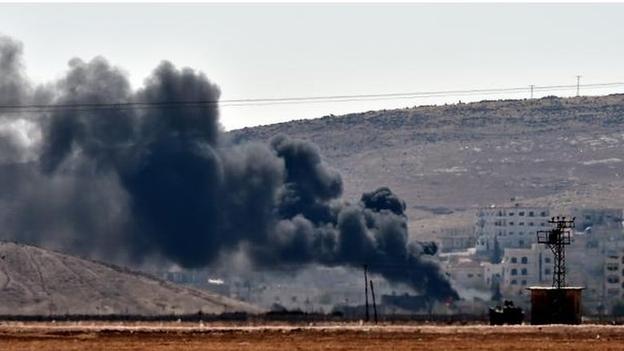
Islamic State (IS) militants have entered the key Syria-Turkey border town of Kobane and are engaged in street-to-street fighting with Syrian Kurd defenders. IS fighters entered eastern districts, raising their black flag on buildings and high ground. Hundreds of civilians are reported to be fleeing to the Turkish border. Taking Kobane, besieged for three weeks, would give IS control of a long stretch of the Syrian-Turkish border. More than 160,000 Syrians, mainly Kurds, have fled the town. Earlier a local official in Kobane, Idriss Nassan, told the BBC that the town would “certainly fall soon”. He confirmed IS was now in control of Mistenur, the strategic hill above the town and that there was heavy shelling. Kobane is now besieged on three sides. ‘Limited weapons’ Asya Abdullah, a senior Kurdish politician and co-leader of the Democratic Union Party, is in Kobane and told the BBC’s Newshour programme that clashes were taking place in three neighbourhoods. She said: “There is fighting on Kobane’s streets now. There are still thousands of civilians in the city and IS is using heavy weapons. If they are not stopped now, there will be a big massacre. “They have surrounded us almost from every side with their tanks. They have been shelling the city with heavy weapons. Kurdish fighters are resisting as much as they can with the limited weapons they have.” Mustafa Bali, a spokesman for Kurds in Kobane, told Agence France-Presse that 2,000 civilians had evacuated on Monday and that all civilians had been ordered to leave. The US Central Command earlier confirmed a fresh air strike by US-led forces had “destroyed two IS fighting positions south of Kobane” but Ms Abdullah said the strikes in the area were “ineffective”. She said: “[IS has] heavy weapons and tanks, that is why our resistance has limits and we need more air strikes.” Ms Abdullah said: “The rest of the world is silent about this imminent massacre.” The BBC’s Paul Adams, near the border, says this has been a long day of constant gunfire, with smoke drifting across the rooftops of Kobane and occasional thunderous explosions reverberating across the valley. He adds that the Kurdish defenders are saying that they relish the challenge, but this feels like the beginning of the end. Our correspondent reported a steady stream of Turkish ambulances racing to and from the border, with many wounded people being treated in hospitals close to the frontier. In other developments on Monday: At least 30 Kurdish fighters were killed in two attacks in the north-eastern Syrian city of Hassakeh, the Syrian Observatory for Human Rights monitoring group saidNato Secretary-General Jens Stoltenberg vowed to protect Turkey, a member state, saying: “Turkey should know that Nato will be there if there is any spillover, any attacks on Turkey as a consequence of the violence we see in Syria”UK Foreign Secretary Philip Hammond met Iraqi Vice-President Ayad Allawi, vowing to use “all the instruments at our disposal” to defeat IS Turkish Kurds and refugees have clashed with Turkish security forces on the border for the past two days. They are angry at Turkey’s perceived inaction over IS in recent months, as well as its refusal to allow them to cross into Syria to fight. Last week, Turkey pledged to prevent Kobane from falling to the militants and its parliament authorised military operations against militants in Iraq and Syria. But it appears to have taken no action so far. Correspondents say Turkey is reluctant to lend support to the Kurdish forces in the town because they are allied to the PKK, banned as a terrorist organisation in Turkey. –BBC Online

